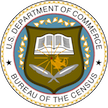 The U.S. Census Bureau announced that for at least the first time in more than a century, in the year ending June 30, 2012, the number of non-Hispanic White births in the United States was lower than the number of deaths among non-Hispanic Whites. According to the data, there were 1,974,894 births of children classified as non-Hispanic Whites in the year ending June 30, 2012. During the same period, 1,987,213 non-Hispanic Whites died.
The U.S. Census Bureau announced that for at least the first time in more than a century, in the year ending June 30, 2012, the number of non-Hispanic White births in the United States was lower than the number of deaths among non-Hispanic Whites. According to the data, there were 1,974,894 births of children classified as non-Hispanic Whites in the year ending June 30, 2012. During the same period, 1,987,213 non-Hispanic Whites died.
The non-Hispanic White population continued to grow slightly due to 188,000 new non-Hispanic White immigrants. Overall, Asian Americans, with a population growth rate of nearly 3 percent, were the fastest growing segment of the population. About 60 percent of the growth rate among Asian Americans was the result of immigration.
The Black population of the United States grew by 1.3 percent in the year ending June 30, 2012. The largest population increase among African Americans was in the state of Texas.










